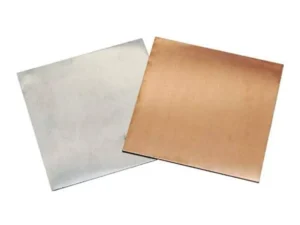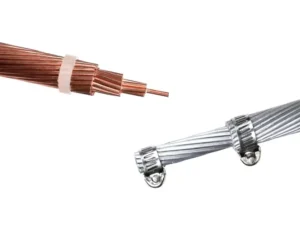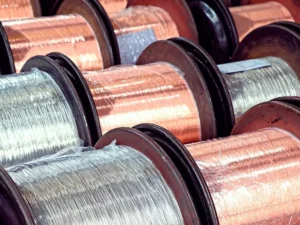A wiring system is necessary for every modern house, building, or structure. It ensures the smooth distribution of power and electricity. Different types of wires are available, and they vary in many ways. However, the debate is more centered on Copper vs. Aluminum Wire.
Both copper and aluminum are excellent wire-making materials. Their extensive usability spurs arguments among electricians and homeowners. Let me tell you why. Electricians always prefer copper wires. However, homeowners tend to be inclined towards aluminum wires.
This leads to argument and chaos. This confusion can result in the wrong wire selection. I’m dedicating this article to explaining the differences between copper and aluminum wires. You’ll know which wires are better and in what way. So, let’s get started!
Overview of Copper & Aluminum

Copper and aluminum are reddish-brown and silver-colored metals, respectively. They both have decent electrical conductivity and are used in wires. However, these metals vary in their chemical and physical properties. Copper is considered superior when it comes to wire making.
Both copper and aluminum are malleable. Above all, they are durable and resistant to corrosion. For example, when exposed to oxygen, copper forms an extra layer called “patina.” This patina layer protects the copper from corrosion. On the flip side, the aluminum is left behind.
In contact with oxygen, aluminum forms a layer of aluminum oxide. This layer ensures rust protection. Remember, aluminum has a lower density than copper, which makes it stand out. The low density of aluminum ensures that it will be lightweight. Copper, on the other hand, is heavyweight.
Both aluminum and copper wires are standard. Their usability depends on the users’ budgets. For example, you’ll easily find a supplier giving aluminum wires at meager rates. But they will be compromised in many ways. However, they will be slightly compromised in terms of performance. Copper wires are expensive but worth the higher prices. In the upcoming section, we’ll further discuss the differences that distinguish them.
What are the Differences Between Copper and Aluminum Wires?

You have a basic grasp of both metal wires from the previous section, right? But that basic overview is not everything. Both of these wires differ from each other in many ways. Let’s explore each of those to give you detailed insight.
1- Thermal Expansion
Thermal expansion is the ability of any metal to contract or expand with temperature change. Both types of wires have different thermal expansion rates. Aluminum wires have a higher rate of thermal expansion and contraction. For instance, in winter, these wires contract quickly, leading to the dispatch of wiring joints.
In summer, aluminum wire expands with an increase in temperature. This drawback causes the wire to melt and, hence, a short circuit. On the flip side, copper wires have a low thermal expansion rate. This means that temperature changes have minimal effect on these wires, making them more reliable.
2- Durability and Strength
Aluminum and copper wires differ in terms of durability and strength. Copper wires are more durable than aluminum ones. Even if they are thin, you can bend them without worrying about cracking. The formation of the patina layer is also one factor in their durability.
What I like about copper wires is their high tensile strength. So, the stress and environmental factors won’t be able to break them. On the other hand, aluminum wires are less durable, and harsh bending breaks them quickly, so they require high maintenance.
Manufacturers use aluminum wires in clusters to enhance their strength. However, this cluster is still prone to breaking and damage. Let me give you a simple stat that will give you a better idea. The tensile strength of aluminum wires is 40% less than that of copper wires. This means they are not suitable for bearing high stress and pressure.
3- Installation Process
Another factor that makes both wires differ, is the installation process. Installing aluminum wires is a difficult process. The reason is that they are brittle hence there is always the risk of their breaking during installation. Moreover, you’ll need particular types of connectors during installation.
On the flip side, the installation process of copper wire is straightforward. Their flexibility makes this process more manageable. For example, they can be easily bent when you need wiring at the corners, and the chances of their breaking are near zero. Moreover, no special connectors or tools are required during installation.
4- Safety Concerns & Weight
Safety is a primary concern during wiring. Copper wires are safer than aluminum wires. As you know, copper wires have a lower thermal expansion rate, so they don’t heat up quickly. So, it reduces the chances of short circuits, which is a big plus.
In contrast, aluminum wires have a higher thermal expansion rate. They get overheated quickly. Therefore, the chances of wires melting and short circuits are very high. Another big difference between these wires is their weight. Generally, you might have heard aluminum wires are lightweight.
That’s half the truth. Aluminum wires are lightweight, but manufacturers use clusters of cables in the wiring system. The reason is that aluminum has less electrical conductance. This cluster increases both the current carrying capacity and the weight of these wires. However, copper wires are also heavy, resulting in a draw.
5- Cost & Affordability
There is a distinct difference in the cost of both wires. Copper wires are more expensive due to their excellent features. For example, they have exceptionally high electrical conductivity. This means that these wires carry more current easily. They are durable and offer optimal performance for an extended duration.
On the other hand, aluminum wires are super cheap. But that’s not good news. Why? Because aluminum wires do not offer excellent performance. They conduct less electricity and overheat quickly. These wires have less life. However, they are suitable for someone with a low budget. They can be decent short-term solutions.
Copper vs Aluminum Wire: Which One Should You Choose?

The answer to this question is “It depends on your preferences.” Both aluminum and copper wires offer distinct qualities. If you want long-term performance, copper wires are the best option. On the contrary, aluminum wires suit someone with a tight budget.
It would be best if you also considered the pros and cons of both wires. I am saying this as it will help you make an informed decision. Copper wires have excellent electrical conductivity, are corrosion-resistant, and are durable. However, they can be super expensive, which is a drawback.
Aluminum wires are compromised in many ways. First, they have a high thermal expansion rate. Moreover, they are less durable, weak, and less electrically conductive. So, they won’t carry optimal current, which is a significant weakness. Therefore, I am in favor of copper wires. Their usability gives peace of mind.
You may argue about their higher pricing. However, high-quality copper wires are worth the higher price. You have to invest once, and they will last for years. Moreover, safety is another factor to be kept in mind. Aluminum wires can cause hazards due to fluctuations in temperature. But copper wires are exceptional in safety.
Can Both Aluminum and Copper Wires be Used?
Yes, both aluminum and copper wires can be used together. But I don’t recommend doing so as it poses many safety hazards. Moreover, mixing these two wires is a highly complex process. Only specialist electricians should do it when necessary.
As I said above, aluminum and copper wires have different characteristics. So, when you join them, the chances of complications are high. A little mistake can lead to severe hazards. As per my experience, the combination of copper and aluminum is not long-lasting. They will overheat and cause a short circuit.
Is it easy to mix these two wires? The answer is NOT! It is a highly complex process. Small mistakes can result in a lower or higher flow of current, which can malfunction the whole electrical system. Different types of connectors and switches reduce the risk to some extent. However, I don’t recommend doing it.
Frequently Asked Questions
Why is aluminum wiring no longer used?
The aluminum wires are weak and don’t have suitable electrical conductivity. So, it does not perform as well as the copper wires do. So, people don’t prefer using them.
Is aluminum stronger than copper?
No, aluminum is not stronger than copper. It is lightweight, easy to break, and its tensile strength is lower than copper. So, copper wires are more durable and robust.
Should I take an aluminum or copper wire?
It would be best if you preferred copper wire over aluminum wire. Copper wire has higher electrical conductivity. Moreover, it is durable, strong, and safe. It is also corrosion-resistant, which makes it more beneficial.
Conclusion
Both copper and aluminum wires offer unique properties. However, aluminum wires are generally not preferred due to their many drawbacks and limitations. Conversely, copper wires are ideal for establishing a wiring system. Copper wires are durable, strong, and extra safe.
However, the copper wires are costly. It makes it problematic for someone to have tight money. As a result, aluminum wires are a cheaper alternative. However, the issue is that these wires have many limitations. Do you want ideal performance or low pricing? This preference will decide which wires are suitable for you.
